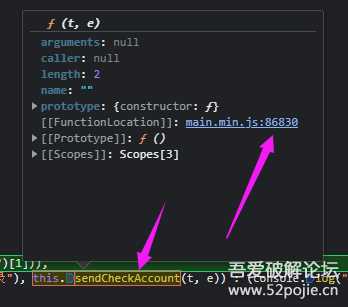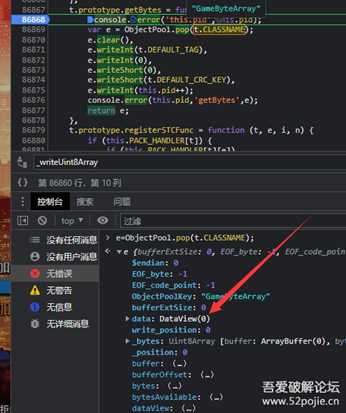H5游戏(一)登录某某首富H5游戏之WebSockets初涉
编辑:jimmy
日期: 2024/11/13 浏览:1 次
H5游戏(二)给游戏做内挂
https://www.52pojie.cn/thread-1631515-1-1.html
前景
H5游戏可跨平台(PC、平板、手机、电视机等都可运行)
实际上他就是一个网页。。所以能打开网页的地方就可能能打开H5游戏(当然了,还有APP嵌套SDK+网页实现的那种)
几年前的农场**,不知道大家用过没有,那种只有一个界面就可以实现自动帮你玩游戏的软件,简直是一款神器。
所以我也想着针对这一款H5游戏,弄一款不用看游戏界面就可以自动帮你玩的小软件。
【备注:图中因为要调试很多信息,所以用到了F12中本地替换JS文件的做法,来打印各种信息等】
开始分析
从wss连接找到切入点
打开网页,登录帐号,打开F12开发者模式,进入游戏。
抓包页面能看到一个wss的连接地址和端口,消息中全部都是二进制数据

1.wss二进制截图.png
从启动器中,能看到第一个可能是发送登录游戏的函数在main.min.js的86844行

2.login函数.png
我们断点这个函数,刷新网页之后调试一番
分析sendCheckAccount
然后我们看到了如果已经连接wss的话,会执行sendCheckAccount函数

3.发现sendCheckAccount.png

3.找到sendCheckAccount.png
那我们去打断点,找到一个
this.getBytes()
4.找到getBytes.png
getBytes
鼠标放在this.getBytes上,查看这个函数是什么

5.getBytes函数.png
e实际上是一个空白DataView,再
var e = ObjectPool.pop(t.CLASSNAME); e.clear(), e.writeInt(t.DEFAULT_TAG), //常量52462 e.writeInt(0), e.writeShort(0), e.writeShort(t.DEFAULT_CRC_KEY), //常量30301 e.writeInt(this.pid++); //每次都会+1
我们再查看sendCheckAccount后续对i参数的操作
分析sendCheckAccount后续
var i = this.getBytes(); //刚才已经看过了 i.writeCmd(255, 1), i.writeInt(this._serverId), i.writeString(t), i.writeString(e), this.sendToServer(i), console.log("发送登录账号密码")
跳转一下writeCmd
e.prototype.writeCmd = function (t, e) { this.writeByte(t), this.writeByte(e) },
再跳转看一下sendToServer函数
t.prototype.sendToServer = function (t) { this.send(t), //省略一些// },
再看send
t.prototype.send = function (e) { return this._socketStatus == t.STATUS_COMMUNICATION ? (this.sendPack(e), !0) : (console.log("发送数据时没和服务连接或者未进入通信状态"), !1) },
如果是链接状态,则sendPack(e)
t.prototype.sendPack = function (e) {//e实际上 在易语言中就是字节集 if (null == e || 0 == e.length) throw new egret.error("创建客户端数据包时数据不能为空!"); var i = t.HEAD_SIZE; //常量12 e.position = 4, //设置位置是4 e.writeInt(e.length - i);//写整数e.length - i var n = Encrypt.getCRC16ByPos(e, i); e.position = 8, //设置位置是8 e.writeShort(n); //写短整数n var o = Encrypt.getCRC16(e, i); e.position = 10; //设置位置是10 e.writeShort(o); //写短整数o Encrypt.encode(e, 8, 4); this.socket_.writeBytes(e) //发送给wss服务器e数据 },
又发现两个新的函数Encrypt.getCRC16ByPos和Encrypt.getCRC16,分别跳转一下可发现(这个是CRC16校验吗?)
他俩都调用了CRC16.update,但是传参有所不同
t.getCRC16ByPos = function (t, e, i) { return void 0 === e && (e = 0), void 0 === i && (i = 0), CRC16.update(t, e, i) }, t.getCRC16 = function (t, e) { return void 0 === e && (e = 0), CRC16.update(t, 0, e) },
因为CRC16几乎都用到了,所以我们分析CRC16
var CRC16 = function () { function t() {} return t.update = function (e, i, n) { console.error('update的参数:',e,i,n);//手动添加的打印 void 0 === i && (i = 0), void 0 === n && (n = 0); var o = 0, a = 0; 0 == n && (n = e.length), e.position = i; for (var r = i; n > r; ++r) a = 255 & t.CRCBitReflect(e.readByte(), 8) ^ o 8 & 16777215, a &= 255, o = t.CRCTable[a] ^ o << 8 & 4294967040//,console.error('r',r,'a',a,'o的结果:',o);//手动添加的打印 console.error('update的结果:',65535 & (0 ^ t.CRCBitReflect(o, 16)));//手动添加的打印 return 65535 & (0 ^ t.CRCBitReflect(o, 16)) }, t.makeCRCTable = function () { for (var e = 0, i = new Array(256), n = 0; 256 > n; ++n) { e = n << 8 & 4294967040; for (var o = 0; 8 > o; ++o) e = 32768 & e ? e << 1 & 4294967294 ^ t.POLYNOMIAL : e << 1 & 4294967294; i[n] = e } return i }, t.CRCBitReflect = function (e, i) { //console.error('CRCBitReflect的参数:',e,i);//手动添加的打印 var n = 0, o = 0; i--; for (var a = 0; i >= a; ++a) o = i - a, 1 & e && (n |= 1 << o & t.DropBits[o]), e = e 1 & 2147483647; //console.error('CRCBitReflect的结果:',n);//手动添加的打印 return n }, t.POLYNOMIAL = 4129, t.CRCTable = t.makeCRCTable(), t.DropBits = [4294967295, 4294967294, 4294967292, 4294967288, 4294967280, 4294967264, 4294967232, 4294967168, 4294967040, 4294966784, 4294966272, 4294965248, 4294963200, 4294959104, 4294950912, 4294934528], t}();
CRC16.update一目了然,那么接下来,就可以实现用易语言模拟H5游戏的登录了吧
利用易语言实现模拟登录游戏
用到的模块
1、Buffer模块(有模块守护、用来读写DataView,某易论坛下载)
2、精易模块
先固定几个写死的函数
1、sendToServer(其实是sendPack)
2、this.getBytes
3、Encrypt.getCRC16ByPos和Encrypt.getCRC16(也就是CRC16.update)
JavaScript位运算符 | 易语言 | ^






